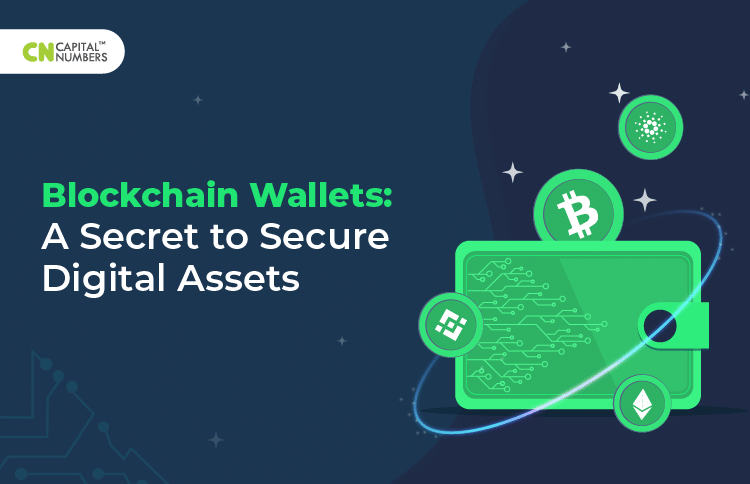Blockchain Wallets: A Secret to Secure Digital Assets
Table of Contents
In recent years, blockchain technology has made headlines as a transformative force changing how we store and transfer value. This technology’s core is blockchain wallets, which allow individuals to store, manage, and send cryptocurrencies. With the increasing popularity of cryptocurrencies, blockchain wallets have become essential for anyone looking to invest in digital assets.
But you can have various questions about a blockchain wallet, including types, how it works, benefits, and more. Let’s dive in to find the answer –
What Is a Wallet?
With a wallet, a user can interact with the blockchain. It can be a piece, software, or specialized hardware device that provides users with an on-chain identity to view and manage cryptocurrency and make transactions.
Multiple types of wallets contain keys. Whenever a wallet is created, a public and private key are generated. Each key is a randomized alphanumeric string. The public key acts as a receiver, an address that can be shared with anyone and where anyone can send cryptocurrency.
On the flip, the private key, the private key, can’t be shared with anyone and acts as a signing mechanism to confirm the validity of a transaction out of the wallet. So, users familiar with the private key have complete control over the holdings within the wallet.
Benefits of Blockchain Wallets
- No geographical barriers
- No intermediaries
- Fewer transaction fees
- Easy to manage
- Simple signup
- Security
Types of Blockchain Wallets
There are different types of blockchain wallets. Let’s discuss the chief ones below –
Hot vs. Cold Wallets
Wallets are essential to keep the keys of your digital cash safe. When choosing the right wallet, you must understand the difference between a “hot” and a “cold” wallet.
Generally, hot wallets are web or mobile-based, and so easy for users to access and manage their crypto holdings. But as they’re connected to the internet, vulnerabilities to hacking exist. Also, third parties often manage hot wallets, including Coinbase for Coinbase Wallet and Consensys for Metamask. It means you need to trust third parties to keep your crypto secure.
As cold wallets are connected to the internet, they’re more secure than hot wallets. Cold wallets are stored on a physical device, including a ledger. Also, it is not as convenient as hot wallets, and users should have a physical device to transact. A cold wallet is the ultimate choice for users with a large amount of assets or are experienced.
Difference between Hot and Cold Wallets
| Features | Hot Wallet | Cold Wallet |
| Price | Usually free, but some pay interest on a stored crypto. | Requires the purchase of an external device, around $500 and $250 |
| Maximum Number of Cryptos | Can store one to ten thousand cryptocurrencies. | Can store anywhere from 1,000 to tens of thousands. |
| Better for | Convenient to access and use for trading. | Better suited for long-term storage. |
| Cybersecurity | Average | Excellent. |
| Loss Protection | Good. They have recovery and backup options and can be accessed from multiple devices. | Average. They have recovery and backup options for a lost password but not for a lost device. |
| Ease of transfer to Exchanges | Excellent. They are easily accessible as the wallet is already internet-connected. | Average. They require an extra step to connect online through USB, Wi-Fi, or QR code. |
Custodial vs. Non-Custodial Wallets
The other difference between wallets depends on who holds the custody of the assets. Custodial wallets are where a third-party exchange holds a user’s private keys. On the other hand, for non-custodial; wallets, the user holds private keys. Generally, both are in the form of cold wallets, and each implementation has tradeoffs.
Custodial wallets are ideal for users who don’t want to deal with the hassle of security and third parties with their private keys. Exchanges, including Binance are considered custodians. Dedicated custodial companies like BitGO have security measures, including direct trading from cold storage, multi-tiered approval structures, and enterprise-grade compliance. But there are still risks of hacks or exchanges going bankrupt.
Non-custodial wallets are best for those who want complete control over their private keys and are ready to take responsibility. There is no recourse when the private key is lost or compromised. Assets are non-recoverable.
Also, there is a non-custodial wallet, MPC, or multi-party computation. It is a technology that allows multiple parties to manage the private key jointly for a wallet. As the keys are broken into multiple encrypted shares, no one party has access to the keys. Each party can independently store, and a preset number of parties should sign a transaction for approval. It is extra secure as hackers should attack multiple parties to gain control over a user’s wallet.
Difference between Custodial and Non-Custodial Wallets
| Features | Custodial Wallets | Non-Custodial Wallets |
| Private Key Management | A custodian or a third party has control of private keys and access to funds | Users have complete control of their private keys and funds |
| Security | Private keys and funds are stored online and depend on the custodian’s security mechanism | Users can decide the ways to secure their private keys |
| Recovery Options | Recovering access to funds may be possible if the user loses the wallet password | If the user loses the private key or seed phrase, he loses access to his funds. |
| User Experience | More user-friendly and don’t require extensive blockchain knowledge | Less user-friendly and more suitable for experienced crypto users |
| Offline Accessibility | Private keys are only accessed online. | For hardware wallets, private keys are only accessed and managed online. |
Also Read: 5 Ways AI with Blockchain Are Transforming Business
Criteria to Choose a Blockchain Wallet
It depends on your preferences and usage type. There is a tradeoff between security and convenience.
- Convenient wallets are less sure, while secure wallets are less convenient.
- If you want to use the fund for a short time and day-to-day transactions, hot wallets are the best option. But a cold wallet is your go-to choice if you want to store funds for a long time.
- Choose a blockchain wallet that is compatible with multiple operating systems.
- Go for a blockchain wallet with a backup seed phrase and security features like passwords.
- Choose a wallet that is easy to use and has an active development company for maintenance, support, and improvement.
Bottom Line
Blockchain wallets are an integral part of the blockchain ecosystem. These wallets are a doorway to accessing the world of cryptocurrency and blockchain technology. With the increasing popularity of cryptocurrencies, blockchain wallets will become more critical than ever. Choosing a wallet that best suits your needs and preferences is essential. So, if you plan to invest in cryptocurrencies, ensure you have a reliable blockchain wallet to keep your assets secure.
As blockchain technology continues to evolve, it’s essential to stay updated with the latest blockchain development trends. To keep abreast of new developments, follow Capital Numbers, a leading software solution provider in India.















